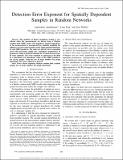Detection error exponent for spatially dependent samples in random networks
Author(s)
Tong, Lang; Anandkumar, Animashree; Willsky, Alan S.
DownloadAnandkumar-2009-Detection error exponent for spatially dependent samples in random networks.pdf (556.4Kb)
PUBLISHER_POLICY
Publisher Policy
Article is made available in accordance with the publisher's policy and may be subject to US copyright law. Please refer to the publisher's site for terms of use.
Terms of use
Metadata
Show full item recordAbstract
The problem of binary hypothesis testing is considered when the measurements are drawn from a Markov random field (MRF) under each hypothesis. Spatial dependence of the measurements is incorporated by explicitly modeling the influence of sensor node locations on the clique potential functions of each MRF hypothesis. The nodes are placed i.i.d. in expanding areas with increasing sample size. Asymptotic performance of hypothesis testing is analyzed through the Neyman-Pearson type-II error exponent. The error exponent is expressed as the limit of a functional over dependency edges of the MRF hypotheses for acyclic graphs. Using the law of large numbers for graph functionals, the error exponent is derived.
Date issued
2009-08Department
Massachusetts Institute of Technology. Department of Electrical Engineering and Computer Science; Massachusetts Institute of Technology. Laboratory for Information and Decision SystemsJournal
IEEE International Symposium on Information Theory, 2009. ISIT 2009.
Publisher
Institute of Electrical and Electronics Engineers
Citation
Anandkumar, A., A. Willsky, and Lang Tong. “Detection error exponent for spatially dependent samples in random networks.” Information Theory, 2009. ISIT 2009. IEEE International Symposium on. 2009. 2882-2886. © 2009 Institute of Electrical and Electronics Engineers.
Version: Final published version
Other identifiers
INSPEC Accession Number: 10842411
ISBN
978-1-4244-4313-0
978-1-4244-4312-3